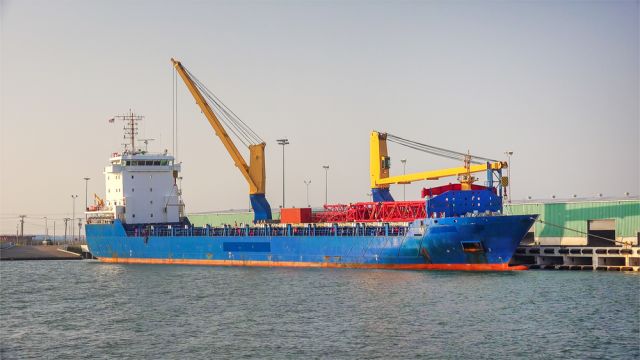
Cargo ship docked at Corpus Christi. (Source: Shutterstock)
Tropical storm Beryl made landfall in Texas as a Category 1 hurricane before weakening again to a tropical storm.
The Port of Corpus Christi, the U.S.’ largest energy export gateway, took precautions in accordance with the 2024 Hurricane Readiness Plan prior to Beryl’s arrival. The Port Authority has yet to update on damages caused by Beryl.
Corpus Christi is located some 208-miles from Houston. The city’s port began operations in 1926 and is strategically located near major Texas oil and gas production, and the Permian Basin in particular is a key beneficiary.
“Life-threatening storm surge inundation will continue this afternoon along the coast of Texas from Port O’Connor to Sabine Pass, including the eastern portion of Matagorda Bay and Galveston Bay,” the National Hurricane Center announced July 8 in a post on X, formerly Twitter.
“Beryl’s trek inland will bring flooding rains and gusty winds through the Mid-Mississippi Valley and into New England this week,” the National Hurricane Center said.
Port of Corpus Christi users were told by the Port Authority to adhere to requirements for marine safety set by the U.S. Coast Guard (USCG) on July 7.
The USCG Captain of Sector Port Corpus Christi (CoTP) set Port Condition Zulu from the Colorado Locks to the U.S. Mexico border, including the Port of Corpus Christi, effective 8:00 a.m. on July 7. “Under this condition, all vessel movement and cargo operations are restricted,” the Port Authority said.
Port of Corpus Christi moves large tonnage
The Port of Corpus Christi has five multi-purpose cargo docks for break bulk cargo, and it boasts being the largest port to handle wind energy components on the U.S. Gulf Coast (USGC), where it has six near-dock laydown yards.
RELATED
Global Energy Watch: Corpus Christi Earns Designation as America's Top Energy Port
The port also features 45 acres of open storage space with direct access to deepwater, railways and highways where it has two bulk docks: one with a 34-ft draft and another with a 47-ft draft. The port has connectivity with three North American Class-1 railroads and two major interstate highways.
The Port of Corpus Christi and its customers recently moved 48.9 million tons (MMton) through the Corpus Christi Ship Channel in the first quarter of 2024, the Port Authority said in an April 19 press release.
Importantly, the port moved 203 MMton in 2023, up 8.1% compared to 2022, according to Port Authority data. Of the total volumes, crude oil exports were 126.1 MMton in 2023, up 12.5% compared to 2022.
Recommended Reading
Aalo Atomics Advancing Microreactor Tech for US Energy Needs
2025-01-08 - Aalo Atomics intends to build an experimental microreactor facility at the Idaho National Laboratory.
Energy Transition in Motion (Week of Dec. 6, 2024)
2024-12-06 - Here is a look at some of this week’s renewable energy news, including a record-setting quarter for solar module capacity in the U.S.
Enphase, NextEnergy Partner on Energy Management Services in the Netherlands
2024-12-10 - The collaboration enables owners of Enphase Energy’s battery technology to participate in NextEnergy’s dynamic tariff program and join its virtual power plant.
Energy Transition in Motion (Week of Dec. 13, 2024)
2024-12-13 - Here is a look at some of this week’s renewable energy news, including the latest on explosive growth in grid-scale energy storage installations.
Midwesterners to CCUS: Not in My Corn Field
2024-12-24 - Midstream firms in the Midwest are running into brick walls of local opposition against carbon capture projects.
Comments
Add new comment
This conversation is moderated according to Hart Energy community rules. Please read the rules before joining the discussion. If you’re experiencing any technical problems, please contact our customer care team.





